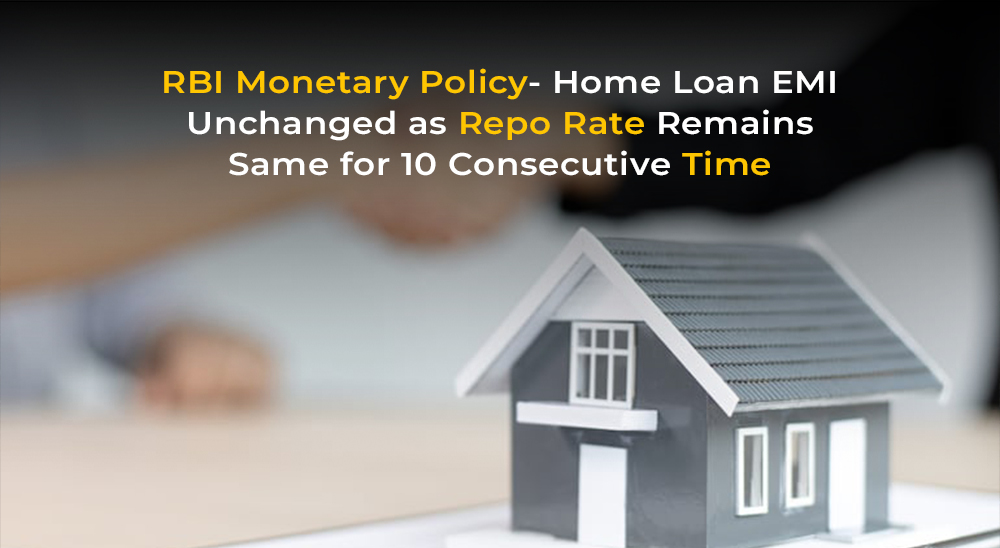RBI Monetary Policy- Home Loan EMI Unchanged as Repo Rate Remains Same for 10 Consecutive Time
Table of Contents
For the 10th consecutive time, the Reserve Bank of India (RBI) has maintained the same repo rate of 6.5 per cent in its bi-monthly Monetary Policy Committee (MPC) review. This means the home loan interest rates and EMI would remain the same. It will help in bringing stability to their financial planning.
When international central banks began hiking interest rates to rein in excessive inflation two years ago, the RBI raised the repo rate several times. But now, the market condition is quite different, with interest rates declining globally. It is improbable that this will have no impact on India. For investors in fixed deposits, this may be their last chance to lock in their funds at the current high rates and take advantage of the current circumstances.
However, market experts believe that a repo rate cut would bring positive opportunities to the real estate market with reduced interest rates ahead of the festive season. Anuj Puri, Chairman – ANAROCK Group said, “The unchanged home loan rates are much-needed demand support in the ongoing festive quarter. Unchanged interest rates will play an important role in achieving and maintaining the sales momentum.”
“With the fundamentals of the Indian economy remaining strong despite global headwinds, geopolitical tensions and inflation well within control, the RBI has once again decided to keep the repo rates unchanged at 6.5% – thus helping the housing market to maintain momentum during the festive season. While a repo rate cut would have been preferable, it is clear that the RBI is on a tightrope walk and must keep various macro-economic factors in mind,” he further stated.
Impact of No Repo Cut in Home Loan EMIs
For homebuyers, the no repo cut can be a relief because house loan interest rates are anticipated to be stable for the foreseeable future. Home loan customers won’t notice an instant shift in their EMIs, especially during a busy period like the holidays when demand for homes usually spikes.
Manju Yagnik, Vice Chairperson of Nahar Group and Senior Vice President of NAREDCO Maharashtra said,”By keeping borrowing costs steady, EMIs remain manageable, encouraging potential homebuyers to invest in property, especially in the affordable housing segment.”
A Longer Wait for Borrowers
Even with constant interest rates, buyers’ decisions are heavily influenced by other variables, such as real estate values. According to recent ANAROCK research, average home prices in India’s top seven cities increased by 23% in Q3 2024 compared to the same time in 2023.
In September, the US Federal Reserve lowered interest rates by 50 basis points, initiating a reversal of the interest rate cycle. Numerous international central banks followed the system by reducing interest rates, which has encouraged many to anticipate an RBI rate decrease as well.
Nevertheless, when other central banks raised rates by larger margins, the RBI raised rates later and by a smaller amount. If other central banks lower their interest rates, the Indian central bank is probably going to follow suit.
Adhil Shetty, CEO of Bankbazaar.com cautions that, “Loan holders may need to wait longer for rate cuts, possibly until December. If inflation stays under control, a rate cut could come. Until then, EMIs will remain at current levels.”
Housing Market Outlook in Q3 2024
The real estate market in Q3 2024 didn’t show a positive sign.
- There is a decline in housing sales by 11% in Q3 2024 compared to Q3 2023.
- New housing project launches fell by 19% during this period.
- Average prices in top metro cities increased to approximately Rs 8,390 per sq. ft. from Rs 6,800 per sq. ft. last year.
Vikas Wadhawan, CFO of REA India and Business Head of PropTiger.com, said in a recent report, “over the last few quarters, prices have increased by 3% to as much as 50% in some prime localities of key markets, affecting immediate buying decisions. However, we expect buyers to gradually adjust to the new price realities.”
Global Decision Impacting RBI’s Repo Rate
Given the geopolitical unrest and uncertainty in the international economy, central banks throughout the world have been cautious, which has led to the RBI’s decision to maintain the repo rate unchanged. The US Federal Reserve recently lowered interest rates, but the RBI seems to be waiting it out to prevent further instability in the home economy.
The Reserve Bank of India (RBI) has adopted a neutral position, indicating that it is prepared to adjust interest rates in response to changing economic circumstances. As for now, home loan holders should wait for possible relief and fixed deposit holders should lock in the present rates, while savers should brace themselves for the likelihood of adjustments in the upcoming months.





